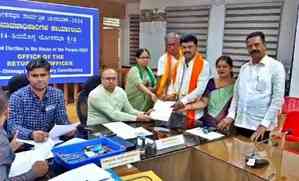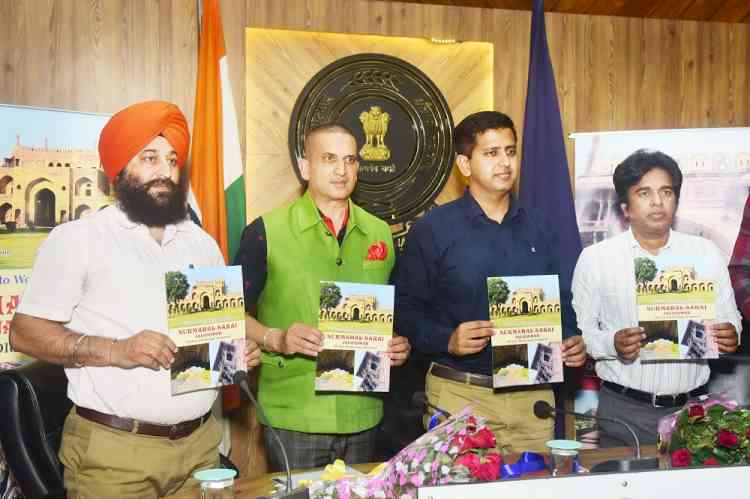FASII president discuss bundle of issues with MSME Secretary
Author(s): City Air NewsBadish Jindal, National President, Federation of Associations of Small Industries India (FASII), greets the MSME Secretary Madhav Lal at his Chamber in Udyog Bhavan, New Delhi, on Monday. Ludhiana, February 25,...


Badish Jindal, National President, Federation of Associations of Small Industries India (FASII), greets the MSME Secretary Madhav Lal at his Chamber in Udyog Bhavan, New Delhi, on Monday.
Ludhiana, February 25, 2013: Badish Jindal, National President, Federation of Associations of Small Industries India (FASII), met the MSME Secretary Madhav Lal at his Chamber in Udyog Bhavan, New Delhi, on Monday, and greeted him on taking over of the said office.
He also detailed the difficulties faced by the Micro and Small Enterprises in the country in the light of the negative attitude displayed by the state governments.
On the Cluster Development Scheme, he stated that the documentation and release of funds at present had to be canalised through the state governments. The state governments, however, slept over the files which led to delay in formation of such clusters. He apprised the Union Secretary that instead of channelling through the state governments all the documentation and other procedures should be handled directly by the Union Government through its MSME Development Institutes.
He also stated that in the administration of projects under the cluster development scheme, wherever there was involvement of state governments, such projects were not getting completed fast because of lethargy and corruption. Citing example, he said, the Union Government sanctioned seven clusters in July, 2012 for Punjab. More than six months had gone and the state government had not even appointed advisors to prepare the Diagnostic Studies Report yet. As such, the seven clusters had got cancelled. Therefore he called for non-involvement of state governments in the Cluster Development Scheme.
He said it is known that the “soft interventions” in the Cluster Development Scheme include technical assistance, capacity building, exposure visits, market development, trust building, etc for the cluster units. In fact, the Union Government involves fully upto the level of soft intervention of the Cluster Development Scheme. The “hard intervention/common facility centers (CFCs)” include creation of tangible “assets” like testing facility, design centre, production centre, Effluent Treatment Plant, training centre, R&D Centre, Raw Material Bank/Sales Depot, Product Display Centre, Information Centre, any other need based facility.
Addine, he said the Union Government does not involve in the aspect of “Hard Intervention”. He therefore suggested that the Union Government should involve in the aspect of “Hard Intervention” which, he said, would keep corruption at bay.
As regards the Integrated Infrastructural Development Scheme (IID), the state governments are the implementing agencies of this scheme. However, owing to lack of funds in the state governments, they avoid implementation of this scheme. Therefore, Jindal pleaded with the MSME secretary that the Special Purpose Vehicles (SPVs) should be made the implementing agencies. In that case, the SPVs would develop and maintain the focal points in their areas, he said.
Reservation of items for exclusive manufacture in MSME Sector has been statutorily provided under the “Industries (Development and Regulation) Act, 1951.” This has been one of the important policy measures for promoting the MSME sector. As such the products - Bread, Pickles and Chutneys, Wooden furniture, Laundry Soaps, Steel almirahs, padlocks, Steel utensils - are reserved for exclusive manufacture in the MSME sector. However he pointed out that many medium and large industry units and multinational entities were manufacturing these items in the country and thus conveniently violate the policy of Reservation. He requested the MSME Secretary for necessary action against the violators of the reservation policy.
The Credit Linked Capital Subsidy Scheme of the Union Government is designed to upgrade the technologies of the Micro and Small Units. Under this scheme, the applications have to be forwarded to the Union Government by the Small Industries Development Bank of India (SIDBI). Owing to corruption in SIDBI, the applications of the Micro and Small Enterprises get locked up in SIDBI, he alleged. This had seriously hit the upgradation efforts of the Micro and Small Enterprises. He brought this plight of the Micro and Small Enterprises to the notice of the MSME Secretary who had agreed to look into.
While drawing attention of the MSME Secretary to the 358 items reserved for exclusive purchase from the Micro and Small Enterprises by the Government Departments and Public Sector Undertakings, he lamented that the departments and PSUs were not buying these items from the Micro and Small Enterprises and thus were not adhering to the guidelines of the Government of India.
All the Commodities, mainly, items of Micro and Small Enterprises (MSE) have started coming through imports from Bangladesh under SAFTA. Majority of these items are Chinese-made but have the trade-mark of Bangladesh. He pointed out that this terribly hit the domestic Micro and Small Enterprises. He therefore, requested the MSME Secretary for steps for curbing such imports.
Further, he quoted the government figures to the MSME Secretary which disclosed that at present imports from China stood at Rs.277 lakh crores which were mainly finished goods and the exports from India to China stood at Rs.86 lakh crore which were mostly raw-materials. This imbalanced trade had forced many micro and small enterprises in the country to down their shutters. He wanted effective steps to arrest this adverse balance of trade between the two countries.
The Union Government in the month of March 2012 notified that all the Central Government Ministries, Departments and Public Sector Undertakings should procure minimum 20 percent of their goods or services from Micro and Small Enterprises. He brought to the notice of the MSME Secretary that a few large units had formed a cartel and that they had caused some of the state governments to draw a ceiling of a few crores for minimum purchase of products which had effectively threw the micro and small enterprises away from the Public Procurement Policy of the Union Government. He wanted suitable remedy in this regard for the Micro and Small Enterprises.
A set of provisions have been framed under MSME Development Act, 2006, to arrest delayed payments to Micro and Small Enterprises by the large corporate sector. However, the large corporate sector does not adhere to the provisions of the concerned Act. He requested for more teeth to the Act.

 cityairnews
cityairnews 

















